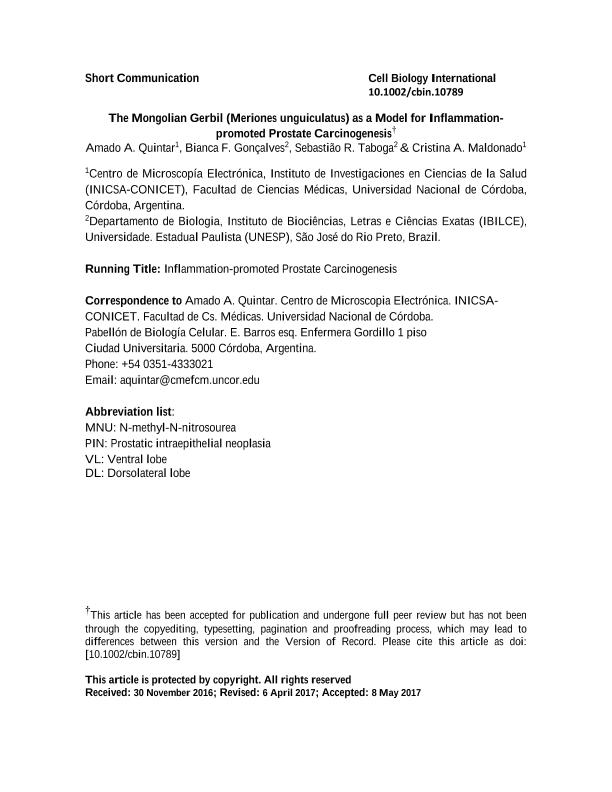Artículo
The mongolian gerbil (Meriones unguiculatus) as a model for inflammation-promoted prostate carcinogenesis
Fecha de publicación:
25/11/2017
Editorial:
Academic Press Ltd - Elsevier Science Ltd
Revista:
Cell Biology International
ISSN:
1065-6995
Idioma:
Inglés
Tipo de recurso:
Artículo publicado
Clasificación temática:
Resumen
One of the recognized issues in prostate cancer research is the lack of animal models allowing the research of pathological, biochemical, and genetic factors in immunocompetent animals. Our research group has successfully employed the gerbil in several studies for prostate diseases. In the present work, we aimed to analyze the effect of chronic bacterial inflammation on N-methyl-N-nitrosourea (MNU)-induced prostate carcinogenesis in gerbils. Histopathological assessment of the prostatic complex revealed that treatment combinations with MNU plus testosterone or bacterial infection resulted in a promotion of prostate cancer, with bacterial inflammation being more effective in increasing premalignant and malignant tissular alterations than testosterone in the prostate. Furthermore, chronic bacterial inflammation itself induced premalignant lesions in the ventral lobe and increased their frequency in the dorsolateral lobe as well as malignant lesions in the ventral prostate. These animals showed a rich inflammatory microenvironment, characterized as intraluminal and periductal foci. These data indicate that chronic inflammation induced by Escherichia coli acts as a potent tumor promoter, in the early stages of carcinogenesis in the gerbil, in line with the hypothesis of inflammation supporting several steps of tumor development in the prostate gland.
Palabras clave:
Androgens
,
Cancer
,
Gerbil
,
Inflammation
,
Prostate
Archivos asociados
Licencia
Identificadores
Colecciones
Articulos(INICSA)
Articulos de INSTITUTO DE INVESTIGACIONES EN CIENCIAS DE LA SALUD
Articulos de INSTITUTO DE INVESTIGACIONES EN CIENCIAS DE LA SALUD
Citación
Quintar, Amado Alfredo; Gonçalves, Bianca F.; Taboga, Sebastião R.; Maldonado, Cristina Alicia; The mongolian gerbil (Meriones unguiculatus) as a model for inflammation-promoted prostate carcinogenesis; Academic Press Ltd - Elsevier Science Ltd; Cell Biology International; 41; 11; 25-11-2017; 1234-1238
Compartir
Altmétricas




